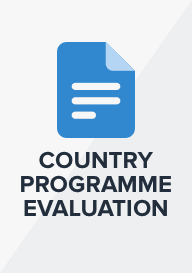
Mid-Term Evaluation of Country Programme (CP 2020-25)
Output 1.1.1 Capacities developed across the whole of government to integrate the 2030 Agenda, the Paris Agreement and other international agreements in development plans and budgets, and to analyse progress towards the SDGs, using innovative and data-driven solutions
Output 1.1.2 Marginalised groups, particularly the poor, women, people with disabilities and displaced are empowered to gain universal access to basic services and financial and non-financial assets to build productive capacities and benefit from sustainable livelihoods and jobs
Output 1.2.1 Capacities at national and sub-national levels strengthened to promote inclusive local economic development and deliver basic services including HIV and related services
Output 1.2.2 Enabling environment strengthened to expand public and private financing for the achievement of the SDGs
Output 1.2.3 Institutions and systems enabled to address awareness, prevention and enforcement of anti-corruption measures to maximize availability of resources for poverty eradication
Output 1.3.1 National capacities and evidence-based assessment and planning tools enable gender-responsive and risk-informed development investments, including for response to and recovery from crisis
Output 1.4.1 Solutions scaled up for sustainable management of natural resources, including sustainable commodities and green and inclusive value chains
Output 1.5.1 Solutions adopted to achieve universal access to clean, affordable and sustainable energy
Output 1.6.1 Country-led measures accelerated to advance gender equality and women’s empowerment
Output 1.6.2 Measures in place and implemented across sectors to prevent and respond to Sexual and Gender Based Violence (SGBV)
Output 2.1.1 Low emission and climate resilient objectives addressed in national, sub-national and sectoral development plans and policies to promote economic diversification and green growth
Output 2.1.2 Capacities developed for progressive expansion of inclusive social protection systems
Output 2.2.1 Use of digital technologies and big data enabled for improved public services and other government functions
Output 2.2.2 Constitution-making, electoral and parliamentary processes and institutions strengthened to promote inclusion, transparency and accountability
Output 2.2.3 Capacities, functions and financing of rule of law and national human rights institutions and systems strengthened to expand access to justice and combat discrimination, with a focus on women and other marginalised groups
Output 2.3.1 Data and risk-informed development policies, plans, systems and financing incorporate integrated and gender-responsive solutions to reduce disaster risks, enable climate change adaptation and mitigation, and prevent risk of conflict
Output 2.4.1 Gender-responsive legal and regulatory frameworks, policies and institutions strengthened, and solutions adopted, to address conservation, sustainable use and equitable benefit sharing of natural resources, in line with international conventions and national legislation
Output 2.5.1 Solutions developed, financed and applied at scale for energy efficiency and transformation to clean energy and zero-carbon development, for poverty eradication and structural transformation
Output 2.6.1 Capacities strengthened to raise awareness on and undertake legal, policy and institutional reforms to fight structural barriers to women’s empowerment
Output 3.1.1 Core government functions and inclusive basic services4 restored post-crisis for stabilisation, durable solutions to displacement and return to sustainable development pathways within the framework of national policies and priorities
Output 3.2.1 National capacities strengthened for reintegration, reconciliation, peaceful management of conflict and prevention of violent extremism in response to national policies and priorities
Output 3.2.2 National and local systems enabled and communities empowered to ensure the restoration of justice institutions, redress mechanisms and community security
Output 3.3.1 Evidence-based assessment and planning tools and mechanisms applied to enable implementation of gender-sensitive and risk-informed prevention and preparedness to limit the impact of natural hazards and pandemics and promote peaceful, just and inclusive societies
Output 3.3.2 Gender-responsive and risk-informed mechanisms supported to build consensus, improve social dialogue and promote peaceful, just and inclusive societies
Output 3.4.1 Innovative nature-based and gender-responsive solutions developed, financed and applied for sustainable recovery
Output 3.5.1 Energy access re-established for crisis-affected populations, with a focus on gender-sensitive, risk-informed and sustainable recovery
Organisational Output 1.1 Evidence based performance analysis and decision making at all levels
Organisational Output 1.2 Cross-cutting approaches fully integrated into UNDP programmes and projects
Organisational Output 1.3 High quality audits and evaluations producing implementable solutions
Organisational Output 2.1 UNDP recognized as a development partner of choice
Organisational Output 2.2 Cost-sharing agreements and projects ensure full cost recovery
Organisational Output 2.3 Quality and efficient management services to support programme delivery
Organisational Output 2.4 Efficient, professional and transparent procurement and value for money
Organisational Output 2.5 UNDP equipped with talented and diverse workforce
Organisational Output 3.1 Common UN approaches facilitate efficient and accelerated joint delivery against sustainable development objectives
Organisational Output 3.2 UNDP support to integrated SDG delivery
Organisational Output 3.3 UNDP contributes fully to the Resident Coordinator function
1: Others


